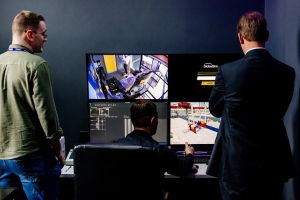


(Posted on 26/10/23)
A new immersive crane simulator that can recreate high-risk scenarios without putting drivers or other port workers in danger has been installed at Tees Dock.
The £400,000 investment in the Full Mission Crane Simulator, manufactured by GlobalSim – the only machine of its type in the north of England – shows PD Ports’ commitment to safety and to helping colleagues achieve continuous improvement in their learning and skills.
The state-of-the-art simulator was imported from the US earlier this summer and has been programmed to exactly replicate the mobile harbour cranes, ship to shore cranes and rubber tyre gantry cranes operated at Teesport, and their surroundings.
Crane drivers can practice what to do if things go wrong, in a non-pressured, safe environment.
The machine can present different conditions, such as high winds or working at night. It can also simulate a hoist break failure, where the container just starts to fall – so the crane operator gets the experience of hearing certain alarms and dealing with specific faults in a safe space.
It is also programmed to train on hazard perceptions, such as a crew member walking underneath a load.
The simulator can also be used by trainee drivers so they can learn the basics of operating a crane without disrupting live operations at the dock.
The investment in the simulator was the idea of Martin Walker, PD Ports group engineering manager, electrical.
“We started thinking about this investment back in 2020, as we were recruiting drivers who needed to be trained and often our plant availability limits us doing this,” he said.
“It was a big investment to make but the benefits this machine with provide have already been demonstrated.
“As well as providing a safe space to learn, the simulator also supports our carbon emission reduction efforts, as the simulator uses less energy than a real crane, no fuel and no carbon emissions.”
Frans Calje, chief executive officer of PD Ports, said: “The simulator offers next level training for our crane drivers. As well as learning how to operate a crane, it gives them a chance to understand the deeper risks in their role and prepares them for any eventuality.
“Without cranes and crane drivers, none of the millions of tonnes of imports that we rely on in the UK would make it off the ships, so it is vital that we invest in our training and make sure we are operating in a way that is as safe, efficient and effective as possible.”
Rio Tinto’s first Pilbara-made iron ore rail car has rolled off the production line in Karratha... Read more
Precision meets progress at Phu My Port, Vietnam. The LPS 550 has been deployed to handle bulk commodities... Read more
bound4blue, a global leader in wind propulsion systems, has expanded its industrial footprint in Asia... Read more
As the industry explores multiple decarbonisation pathways, methanol is gaining attention as a practical... Read more
Technology group Wärtsilä will supply an integrated hybrid propulsion system for a bulk carrier... Read more
Superior Industries, Inc., a US-based manufacturer and global supplier of bulk material processing and... Read more
ESL Shipping has taken a significant step forward in digitalisation by deploying a new multichannel... Read more
Condition Monitoring Technologies (CMT) has deepened its presence across Asia’s most influential... Read more
After delivering its first full-scale seagoing project last week, Wattlab signed a contract at Europort... Read more
Steelpaint GmbH has reported strong growth in orders for corrosion protection coatings on Germany&rsquo... Read more